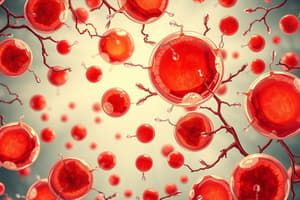Podcast
Questions and Answers
What is the primary function of albumin in blood plasma?
What is the primary function of albumin in blood plasma?
- Facilitating immune responses
- Transporting lipids and fat-soluble vitamins
- Maintaining oncotic pressure (correct)
- Promoting blood clot formation
Which type of globulin primarily functions in immune defense by producing antibodies?
Which type of globulin primarily functions in immune defense by producing antibodies?
- Beta globulins
- Gamma globulins (correct)
- Complement proteins
- Alpha globulins
What condition is characterized by low plasma protein levels?
What condition is characterized by low plasma protein levels?
- Anemia
- Edema
- Hypoproteinemia (correct)
- Hyperproteinemia
What is one of the main roles of fibrinogen in the blood?
What is one of the main roles of fibrinogen in the blood?
How does liver health affect plasma protein levels?
How does liver health affect plasma protein levels?
Which plasma protein is most abundant and constitutes about 60% of total plasma proteins?
Which plasma protein is most abundant and constitutes about 60% of total plasma proteins?
What role do complement proteins play in the body?
What role do complement proteins play in the body?
Which plasma protein is primarily involved in the transport of iron and cholesterol?
Which plasma protein is primarily involved in the transport of iron and cholesterol?
Flashcards are hidden until you start studying
Study Notes
Plasma Proteins Overview
- Definition: Plasma proteins are proteins present in blood plasma, crucial for various physiological functions.
Major Types of Plasma Proteins
-
Albumin
- Most abundant plasma protein (about 60% of total plasma proteins)
- Functions:
- Maintains oncotic pressure, preventing edema
- Transports various substances (hormones, vitamins, drugs)
-
Globulins
- Composed of three main types:
- Alpha globulins: Involved in transporting lipids and fat-soluble vitamins
- Beta globulins: Transport iron and cholesterol
- Gamma globulins: Primarily immunoglobulins (antibodies) for immune response
- Functions: Immune defense, transport substances, and clotting factors
- Composed of three main types:
-
Fibrinogen
- Key protein in blood clotting (converts to fibrin during coagulation)
- Produced by the liver
- Represents about 4% of plasma proteins
-
Complement Proteins
- Part of the immune system
- Aids in the lytic activity against pathogens and enhances inflammatory response
Functions of Plasma Proteins
- Transport: Carry hormones, nutrients, and waste products in the blood.
- Buffering: Help maintain blood pH.
- Immune Function: Protect against infections (via antibodies).
- Coagulation: Essential in blood clot formation, preventing excessive bleeding.
Synthesis and Regulation
- Mostly synthesized in the liver (exceptions like immunoglobulins produced by plasma cells).
- Plasma protein levels can be influenced by:
- Diet (nutritional intake of proteins)
- Liver health (liver disease can impair protein synthesis)
- Inflammation and immune responses (can alter protein levels)
Clinical Significance
- Hypoproteinemia: Low plasma protein levels, can lead to edema, decreased wound healing.
- Hyperproteinemia: High plasma protein levels, often indicative of dehydration or chronic inflammatory conditions.
- Diseases: Alteration in specific plasma proteins can indicate various conditions (e.g., liver disease, kidney disease, infections).
Summary
- Plasma proteins are essential for maintaining homeostasis, health, and bodily functions. They play critical roles in transport, immune defense, and clotting, and their levels can serve as important biomarkers for various clinical conditions.
Plasma Proteins: An Overview
- Plasma proteins are found in blood plasma and perform essential functions in the body.
- Albumin is the most abundant plasma protein, accounting for 60% of the total.
- Albumin maintains oncotic pressure, preventing fluid leakage from blood vessels, and transports various substances like hormones, vitamins, and drugs.
- Globulins are another significant group of plasma proteins, categorized into alpha, beta, and gamma globulins.
- Alpha globulins transport lipids and fat-soluble vitamins.
- Beta globulins transport iron and cholesterol.
- Gamma globulins are primarily immunoglobulins, also known as antibodies, and play a crucial role in immune responses.
Fibrinogen
- Fibrinogen is critical for blood clotting, converting to fibrin during the coagulation process.
- It is produced by the liver and constitutes approximately 4% of plasma proteins.
Complement Proteins
- Complement proteins are part of the immune system, aiding in the destruction of pathogens and amplifying inflammatory responses.
Functions of Plasma Proteins
- Plasma proteins play vital roles in:
- Transport: Carrying hormones, nutrients, and waste products in the blood.
- Buffering: Maintaining proper blood pH.
- Immune Function: Protecting against infections through antibodies.
- Coagulation: Ensuring blood clot formation to prevent excessive bleeding.
Synthesis and Regulation
- Most plasma proteins are synthesized in the liver, with the exception of immunoglobulins, which are produced by plasma cells.
- Plasma protein levels are influenced by:
- Diet: Nutritional intake of proteins.
- Liver health: Liver disease can impair protein synthesis.
- Inflammation and immune responses: These can alter protein levels.
Clinical Significance
- Hypoproteinemia: Low plasma protein levels can lead to edema (fluid build-up in tissues), decreased wound healing, and other complications.
- Hyperproteinemia: High plasma protein levels are often related to dehydration or chronic inflammatory conditions.
- Diseases: Alterations in specific plasma protein levels can be indicators of various diseases, including liver disease, kidney disease, and infections.
Summary
- Plasma proteins are crucial for maintaining homeostasis, overall health, and proper bodily functions.
- They play vital roles in transport, immune defense, and clotting, and their levels serve as important biomarkers for clinical conditions.
Studying That Suits You
Use AI to generate personalized quizzes and flashcards to suit your learning preferences.




